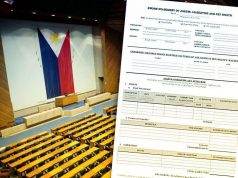China calls reported reclamation activities in Spratlys ‘fake news’

By Alyssa Nicole O. Tan, Reporter
CHINA on Wednesday denied allegations that it is conducting reclamation activities in unoccupied features of the resource-rich Spratlys Island, parts of which are claimed by the Philippines and calls it the Kalayaan Island Group.
“Fake news,” the Chinese Embassy in the Philippines said in response to an article published by Bloomberg News on Tuesday indicating that Beijing is building in several land features in the disputed areas of the South China Sea.
Bloomberg cited warnings from Western officials on Beijing’s latest construction activity, which they said indicated an attempt to advance a new status quo.
The report included graphics such as a map and images on changes in land features, mentioning Whitsun Reef, locally known as Julian Felipe Reef, and Sandy Cay, locally known as Pag-asa Cay, “where previously submerged features now sit permanently above the high-tide line.”
A 2002 Declaration on the Conduct of Parties in the South China Sea, where both the Philippines and China are signatories, provides that “no new structures shall be constructed in an uninhabited feature of South China Sea.”
China’s Foreign Ministry in Beijing had denied the article, saying “the relevant report is purely made out of thin air.”
Last year, the Philippines sent extra vessels to patrol areas within its exclusive economic zone after over 200 Chinese militia ships were spotted lingering in the disputed waters, while at least six Chinese Navy vessels and poachers were caught collecting giant clams known as Taklobo in the Philippines, a specie classified as vulnerable on the International Union for Conservation of Nature’s Red List.
The Philippine Department of Foreign Affairs said it has directed relevant agencies to verify the report.
“We are seriously concerned as such activities contravene the Declaration of Conduct on the South China Sea’s undertaking on self-restraint and the 2016 Arbitral Award,” Foreign Affairs Spokesperson Maria Theresa C. Daza told reporters via WhatsApp Tuesday evening.
“We have asked relevant Philippine agencies to verify and validate the contents of this report,” she added.
The US Embassy in the Philippines did not respond to a Viber message seeking comment before the print deadline.
PHL-CHINA MEETING
Philippine President Ferdinand R. Marcos, Jr., who took office in July, is set to visit China in early January and hold a bilateral meeting with Chinese President Xi Jinping.
“I expect nothing less than a firm assertion of our sovereign and legal rights in the West Philippine Sea,” Senator Ana Theresia “Risa” N. Hontiveros-Baraquel told reporters in a Viber message on Wednesday.
“Everything that is to be discussed should be in the context of China’s incessant incursions in our territories; therefore, every prospective deal or engagement should be premised upon China’s recognition of the Philippine’s rightful ownership of the West Philippine Sea,” she added.
The South China Sea, a key global shipping route, is subject to overlapping territorial claims involving China, Brunei, Malaysia, the Philippines, Taiwan and Vietnam. Each year, trillions of dollars of trade flow through the sea, which is also rich in fish and gas.
Ms. Hontiveros noted that Mr. Marcos said in his first address to Congress that he will not give up a square inch of Philippine territory.
“I am pleased that finally, under this administration, all senators have recently unanimously supported a resolution expressing the sense of the Senate that condemns the continued intimidation, threats, and harassment of Chinese vessels toward Philippine boats and personnel,” she said.
The Senate recently adopted a still unnumbered resolution expressing “disgust” over China’s maneuvers in the South China Sea, noting risks that may lead to short and long-term implications for the Philippines’ national security.
“President Marcos would be well advised to study and understand this resolution so as to make an unyielding stand, as he should, for the sake of our country and the Filipino people,” Ms. Hontiveros said.
The opposition senator said Manila should repeatedly assert its rights while simultaneously strengthening economic and trade cooperation with Beijing.
“Government must always be reminded, however, that economic gains from our relationship with China should not supersede our duty to protect our sovereignty and uphold our national interest,” she said.
On joint oil and gas exploration in the disputed sea, Ms. Hontiveros said: “China should first recognize and respect the 2016 Arbitral Ruling. Only then could both parties start to truthfully and faithfully discuss a joint exploration.”
The Permanent Court of Arbitration based in the Hague upheld the Philippines’ rights to its exclusive economic zone within the disputed waterway.
China has repeatedly rejected the 2016 arbitral ruling, which voided its claim to more than 80% of the South China Sea based on a 1940s nine-dash line map.



